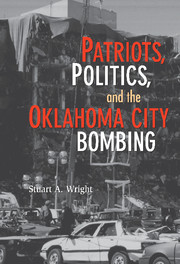Book contents
- Frontmatter
- Contents
- List of Figures and Tables
- Preface and Acknowledgments
- 1 CODICIL TO A PATRIOT PROFILE
- 2 PATRIOTS, POLITICAL PROCESS, AND SOCIAL MOVEMENTS
- 3 THE HISTORICAL CONTEXT OF PATRIOT INSURGENCY
- 4 THE FARM CRISIS, THREAT ATTRIBUTION, AND PATRIOT MOBILIZATION
- 5 STATE MOBILIZATION: BUILDING A TRAJECTORY OF CONTENTION
- 6 THE GUN RIGHTS NETWORK AND NASCENT PATRIOTS: RISE OF A THREAT SPIRAL
- 7 MOVEMENT-STATE ATTRIBUTIONS OF WAR: RUBY RIDGE AND WACO
- 8 PATRIOT INSURGENCY AND THE OKLAHOMA CITY BOMBING
- 9 AFTER OKLAHOMA CITY: PATRIOT DEMOBILIZATION AND DECLINE
- References
- Index
9 - AFTER OKLAHOMA CITY: PATRIOT DEMOBILIZATION AND DECLINE
Published online by Cambridge University Press: 05 June 2012
- Frontmatter
- Contents
- List of Figures and Tables
- Preface and Acknowledgments
- 1 CODICIL TO A PATRIOT PROFILE
- 2 PATRIOTS, POLITICAL PROCESS, AND SOCIAL MOVEMENTS
- 3 THE HISTORICAL CONTEXT OF PATRIOT INSURGENCY
- 4 THE FARM CRISIS, THREAT ATTRIBUTION, AND PATRIOT MOBILIZATION
- 5 STATE MOBILIZATION: BUILDING A TRAJECTORY OF CONTENTION
- 6 THE GUN RIGHTS NETWORK AND NASCENT PATRIOTS: RISE OF A THREAT SPIRAL
- 7 MOVEMENT-STATE ATTRIBUTIONS OF WAR: RUBY RIDGE AND WACO
- 8 PATRIOT INSURGENCY AND THE OKLAHOMA CITY BOMBING
- 9 AFTER OKLAHOMA CITY: PATRIOT DEMOBILIZATION AND DECLINE
- References
- Index
Summary
In this final chapter, I explore the impact of the Oklahoma City bombing on the Patriot movement and the transformation of contention between claimants and the state. The bombing set into motion a complex interplay of forces as state actors, challenging groups, and third parties all sought to seize opportunities, assign blame, attribute threat, mobilize resources, shore up alliances or form new ones, and recalibrate their respective frames. In the post–Oklahoma City political climate, the impact of the bombing on the Patriot movement remained uncertain for a period of time. It was not obvious in the short term that the bombing would have an adverse effect on the movement. Some Patriot insurgents forged ahead by committing new acts of violence, and the number of Patriot groups continued to grow well into 1996 (Southern Poverty Law Center, 1996). However, the movement also encountered an increasingly hostile political environment and well-organized opposition in the wake of the April 19 blast. Survivors and families of victims formed alliances with state actors, media, and other interest groups to effectively mobilize resources and public opinion against Patriot actors and organizations. The victim rights frame constructed in the ashes of Oklahoma City succeeded in capturing broad public support and readily trumped the Patriot war frame. Victims' rights advocacy groups, buoyed under the aegis of state and federal agencies, became a powerful political force, petitioning the courts and lobbying Congress to expand the legal rights of victims.
- Type
- Chapter
- Information
- Patriots, Politics, and the Oklahoma City Bombing , pp. 194 - 218Publisher: Cambridge University PressPrint publication year: 2007



